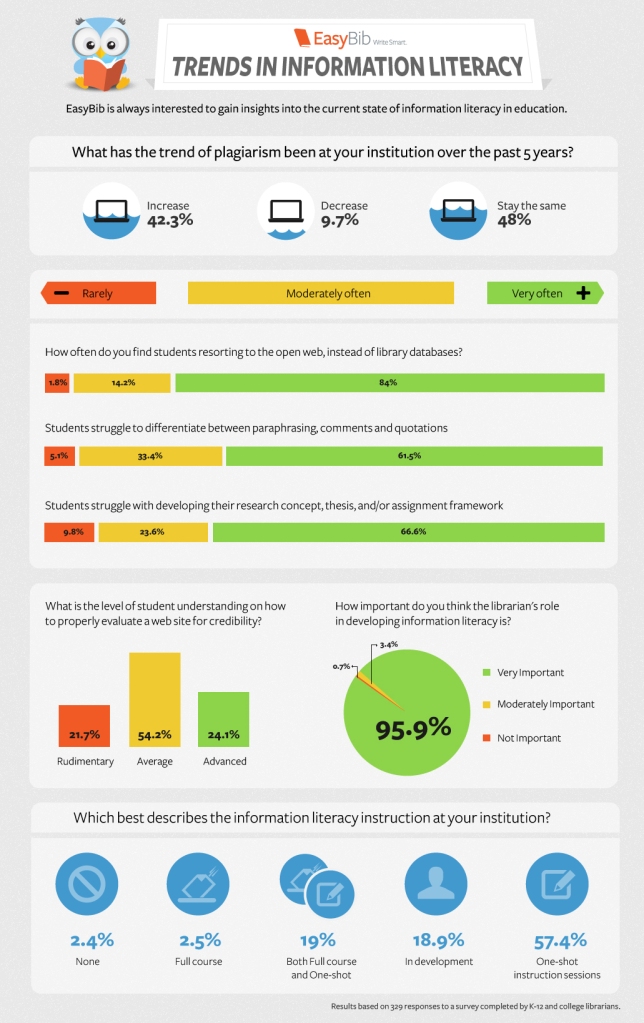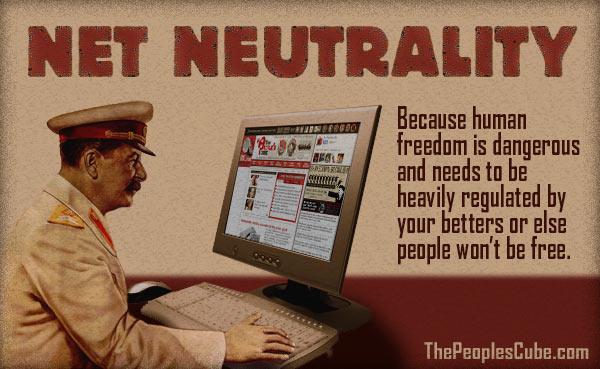Archive of ‘information literacy’ category
Search Twitter
Using advanced search in Twitter
https://support.twitter.com/articles/71577-using-advanced-search
is very similar to using advanced search in your SCSU online databases:
Advanced Search – Guided-Style Find Fields
http://support.ebsco.com/help/
Searching successfully Twitter is one of the techniques to mine Twitter and grow your audience:
20 tips for social media marketing
http://www.socialmediaexaminer.com/social-media-marketing-tips-pros
Digital & Information Literacy a la EasyBib
Tips for Teaching Digital & Information Literacy
http://content.easybib.com/tips-for-teaching-digital-information-literacy/#.VH4eeTHF_To
Digital & Information Literacy Lesson Highlights:
- Understanding top-level domains
- How Google searches change based on the personal information they collect
- Evaluating hoax sites
- Search tips to make your Google search effective
- Using Creative Commons-licensed images through Google Images
- …and more!
Digital Literacy and Web Literacy: What’s the Difference?
http://content.easybib.com/digital-literacy-and-web-literacy-whats-the-difference/
Resources for Teaching Digital & Web Literacies
http://content.easybib.com/resources-for-teaching-digital-web-literacies
The Challenge of Information Literacy in a time of Social Media and Pervasive Information by Neil Krasnoff
the challenge of social media with respect to information literacy is that networked individuals are continually bombarded with information. Thus, information literacy’s importance must make the leap from the academic world, where purposeful information search is the norm, to “real life,” where information continually competes for the audience.
http://content.easybib.com/infographic-information-literacy-issues

pro domo sua: academic library, information litreacy etc
Beyond ‘Information Literacy’
http://www.rochester.edu/pr/Review/V68N1/inrev15.html
How can academic libraries best help students sort through the growing thicket of online information? By Stanley Wilder
The premise of information literacy is that the supply of information has become overwhelming, and that students need a rigorous program of instruction in research or library-use skills, provided wholly or in part by librarians.
The idea behind information literacy is that our typical freshman is drowning in information, when in fact Google provides her with material she finds good enough, and does so instantaneously. Information literacy assumes that she accepts unquestioningly the information she finds on the Internet, when we know from research that she is a skeptic who filters her results to the best of her ability. Information literacy tells us that she cannot recognize when she needs information, nor can she find, analyze, or use it, when she demonstrably does all of those things perfectly well, albeit at a relatively unsophisticated level.
Simply put, information literacy perceives a problem that does not exist. Furthermore, it misses the real threat of the Internet altogether—which is that it is now sufficiently simple and powerful that students can graduate without ever using the library. That is unfortunate because, for all its strengths, the Internet cannot give students the high-quality scholarly information that is available only through subscription, license, or purchase.
As Roy Tennant noted in the January 1, 2001, Library Journal, “only librarians like to search; everyone else likes to find.” Any educational philosophy is doomed to failure if it views students as information seekers in need of information-seeking training.
Information literacy is also harmful because it encourages librarians to teach ways to deal with the complexity of information retrieval, rather than to try to reduce that complexity.
“The library is a place where readers come to write, and writers come to read.” Dow casts students not as information seekers, but as apprentices engaged in a continuous cycle of reading and writing.
Librarians should use their expertise to deepen students’ understanding of the disciplines they study. My note: ant that’s why LRS needs area specialists, not traditional librarians.
The library must also do a better job of reaching more students, more often. Librarians need to use their expertise to make the library’s online presence approach the simplicity and power of the Internet.
Project Information Literacy
about early adults and their research habits
Scholarly Communication and Information Literacy
Intersections of Scholarly Communication and Information Literacy
Creating Strategic Collaborations
for a Changing Academic Environment
http://www.ala.org/acrl/sites/ala.org.acrl/files/content/publications/whitepapers/Intersections.pdf
p. 4. digital literacies (including teaching new technologies and rights issues, and the emergence of
multiple types of non-textual content);
p. 7. every librarian has a role in teaching, whether formally or informally, about scholarly
communication issues.
p. 11. Librarians play a unique role in teaching faculty, graduate students, and undergraduate students about
the complete life cycle of information through educational programs geared to different disciplines and
levels of student learning. Undergraduates are now likely to be required to work collaboratively on a
wiki or to write a blog for a class as the first steps in a writing or research assignment or even as the final
product.
p. 12. ALA OITP Digital Literacy Task Force defined digital literacy as, “the ability to use information and communication technologies to find, evaluate, create, and communicate information, requiring both cognitive and technical skills” (2012, p. 1). In its statement of recommendations to governments and organizations, the International Federation of Library Associations and Institutions noted that, “media and information literacy includes all types of information resources: oral, print, and digital” (IFLA 2011). Comprehending all kinds of content, including data, statistical, financial, and visual, as well as text, is a critical outcome intended by media and information literacy programs.
p. 13. Data literacy is an area where the impact of external forces, ranging from the increasing demand on students to find and use data to funder mandates to have data management plans, point to a critical area of intersection between scholarly communication and information literacy.
p. 14. Transliteracy is an emerging concept that challenges the current structures of information literacy and scholarly communication programs alike. The definition indicates that this is a key area where scholarly communication and information literacy intersect:
The essential idea here is that transliteracy is concerned with mapping meaning across different media and not with developing particular literacies about various media. It is not about learning text literacy and visual literacy and digital literacy in isolation from one another but about the interaction among all these literacies. (Ipri, 2010, p. 532)
p. 15. Intersection 3: New Roles for Librarians
Reframing Information Literacy as a Metaliteracy
Reframing Information Literacy as a Metaliteracy
https://comminfo.rutgers.edu/~tefko/Courses/e553/Readings/Mackey%20Metalitreacy%20CLR%202011.pdf
https://crl.acrl.org/index.php/crl/article/view/16132
https://pdfs.semanticscholar.org/6d77/5e0711644fad14b8abb22314fb19b9c79bca.pdf
p. 62
Metaliteracy promotes critical thinking and collaboration in a digital age, providing a comprehensive framework to effectively participate in social media and online communities.
Metaliteracy challenges traditional skills-based approaches to information literacy by recognizing related literacy types and incorporating emerging technologies. Standard definitions of information literacy are insufficient for the revolutionary social technologies currently prevalent online.
Information literacy was the term used most frequently in the United States from the late 1980s through most of the 1990s and is still used regularly. (Craig Gibson, “Information Literacy and IT Fluency: Convergences and Divergences,” Reference & User Services Quarterly 46, no. 3 (2007): 24.)
p. 64. Social media and online collaborative communities are not specifically addressed in the standard definitions, but many of the highlighted skills are pertinent to today’s information environment.
…these institutional frameworks are not on the cutting edge of emerging trends; they lag behind the innovations of Web 2.0 and social media. Metaliteracy expands the scope of information literacy as more
than a set of discrete skills, challenging us to rethink information literacy as active knowledge production and distribution in collaborative online communities.
Media Literacy,
Digital Literacy,
Visual Literacy,
Cyberliteracy,
Information Fluency,
Metaliteracy
p. 69. While new literacy movements have similar foundation elements to information literacy, specifically
related to critical reading and critical thinking, as well as proficiencies in finding, synthesizing, and creating information, differences are often emphasized based on the specificity of technology or media
formats. As each new form of literacy is introduced, the shared literacy goals related to critical thinking and information skills are often overlooked, creating an unnecessary divide between information literacy
and other literacy types. The information literacy literature has also contributed to this separation in an effort to clarify important distinctions between information and computer skills, or between traditional
bibliographic instruction and new media literacy. Metaliteracy reinforces stronger
connections between information literacy and other literacy frameworks. This approach looks at the foundation principles that unite information and technology, rather than focusing on differences based
on discrete skills, distinct technologies, or media formats.
x-literacies
Jon Dron’s blog
https://landing.athabascau.ca/blog/view/708453/x-literacies
Computer literacy
Internet literacy
Digital literacy
Information literacy
Network literacy
Technology literacy
Critical literacy
Health literacy
Ecological literacy
Systems literacy
Statistical literacy
New literacies
Multimedia literacy
Media literacy
Visual literacy
Music literacy
Spatial literacy
Physical literacy
Legal literacy
Scientific literacy
Transliteracy
Multiliteracy
Metamedia literacy
Role of Libraries in Closing the Digital Skills Gap
Keynote, Libraries as a Bridge: The Role of Libraries in Closing the Digital Skills Gap
by Bobbi Newman • 014
Information Literacy and Social Media: Selected Practices and Discourses
Cameron Hoffman – Concordia University Libraries
Librarians’ Forum – November 27, 2008
https://library.concordia.ca/about/staff/forum/discourseanalysis.pdf
Net Neutrality
The companies lobbying furiously against strong net neutrality, in one chart
http://www.vox.com/xpress/2014/11/12/7196761/net-neutrality-lobbying
/cdn0.vox-cdn.com/uploads/chorus_asset/file/2448670/net_neutrality_lobbying_chart.0.png)
What is network neutrality?
Consumers generally connect to the internet one of two ways. They can subscribe to a residential broadband service from a company such as Time Warner Cable. Or they can subscribe to wireless internet access from companies such as Sprint.
These companies have spent billions of dollars laying cables in the ground (in the case of residential internet access) or erecting cell phone towers (for wireless access) to ensure that customers have fast, reliable service.
Network neutrality is the idea that these companies should treat all internet traffic equally. It says your ISP shouldn’t be allowed to block or degrade access to certain websites or services, nor should it be allowed to set aside a “fast lane” that allows content favored by the ISP to load more quickly than the rest.
Since the term was coined more than a decade ago, it has been at the center of the debate over internet regulation. Congress, the Federal Communications Commission(FCC), and the courts have all debated whether and how to protect network neutrality.
Advocates argue that network neutrality lowers barriers to entry online, allowing entrepreneurs to create new companies like Google, Facebook, and Dropbox. But critics warn that regulating the broadband market could be counterproductive, discouraging investment in internet infrastructure and limiting the flexibility of ISPs themselves to innovate.
In January, an appeals court invalidated FCC regulations designed to protect network neutrality. The agency is currently considering how to respond.
QuickWire: College and Library Groups Petition FCC on Net Neutrality
Netflix is a Data Hog And other myths about Net Neutrality
https://medium.com/backchannel/netflix-is-a-data-hog-6e790140b189

http://theoatmeal.com/blog/net_neutrality
technology for social workers
Plan for Sylvester Lamin’s course:
- introduce myself – 5 min
- discuss with students how they see the impact of technology on their work – 5 min
- discuss with students the implications of technology on their work – 15
http://www.socialworklicensure.org/articles/social-media-social-work.html
http://www.socialworkblog.org/practice-and-professional-development/2011/07/social-work-social-media-where-are-the-ethical-boundaries/
http://www.theguardian.com/social-care-network/2013/jul/23/social-workers-social-media-challenge-perception
email as unreliable medium
privacy
security - discuss with students the possibilities, which SCSU resources and Internet resources can provide for collaboration, creativity and streamlining the work of the social worker – 15
File space at SCSU versus other free resources
keeping data in the cloud
collaborating on documents and policies
sharing data with clients - Other issues, ideas – 10